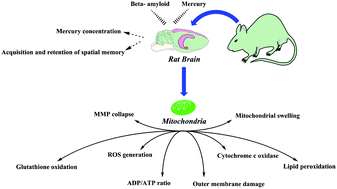当前位置:
X-MOL 学术
›
Metallomics
›
论文详情
Our official English website, www.x-mol.net, welcomes your
feedback! (Note: you will need to create a separate account there.)
Effects of mercuric chloride on spatial memory deficit-induced by beta-amyloid and evaluation of mitochondrial function markers in the hippocampus of rats.
Metallomics ( IF 2.9 ) Pub Date : 2020-01-29 , DOI: 10.1039/c9mt00161a Ladan Behzadfar 1 , Shokoufeh Hassani , Hossein Feizpour , Nakisa Abbasian , Armin Salek Maghsoudi , Ghorban Taghizadeh , Jalal Pourahmad , Mohammad Sharifzadeh
Metallomics ( IF 2.9 ) Pub Date : 2020-01-29 , DOI: 10.1039/c9mt00161a Ladan Behzadfar 1 , Shokoufeh Hassani , Hossein Feizpour , Nakisa Abbasian , Armin Salek Maghsoudi , Ghorban Taghizadeh , Jalal Pourahmad , Mohammad Sharifzadeh
Affiliation

|
Mercury is a highly poisonous heavy metal abundantly found in the environment in its inorganic form. Although evidence have been provided about the possible role of inorganic mercury in the pathology of Alzheimer's disease (AD), its effect on cognitive and mitochondrial functions have not yet been completely understood. Thus, the purpose of the present study was to examine the effects of the chronic exposure to mercuric chloride (0.4, 0.8 and 1.6 mg kg-1 per day for 3 weeks) through drinking water (by gavage) on spatial learning and memory and hippocampal mitochondrial function in beta-amyloid treated rats (1 μg per μL per side, intrahippocampally). The acquisition and retention of spatial memory were evaluated by the Morris water maze (MWM) test. Several parameters of hippocampal mitochondrial function were also measured. The results indicated that mercury impaired spatial learning and memory as well as aggravated Aβ-induced memory impairments in a concentration-dependent manner. Furthermore, mercury exposure resulted in a significant increase in ROS generation, MMP collapse, mitochondrial swelling, glutathione oxidation, lipid peroxidation, and outer membrane damage. In addition, a reduced cytochrome c oxidase (complex IV) activity and elevated ADP/ATP ratio in the rats' hippocampus was also observed. The findings of the current study revealed that chronic mercury exposure led to mitochondrial dysfunction, which resulted in spatial memory impairments. The results also showed that mercury can exacerbate the toxic effects of Aβ on spatial memory and hippocampal mitochondrial function.
中文翻译:

氯化汞对β-淀粉样蛋白诱导的大鼠空间记忆障碍的影响以及大鼠海马线粒体功能标志物的评价。
汞是一种剧毒的重金属,以无机形式存在于环境中。尽管已经提供了有关无机汞在阿尔茨海默氏病(AD)病理中可能发挥作用的证据,但尚未完全了解其对认知和线粒体功能的影响。因此,本研究的目的是研究通过饮用水(通过管饲法)长期暴露于氯化汞(每天0.4、0.8和1.6 mg kg-1,持续3周)对空间学习和记忆及海马的影响。 β-淀粉样蛋白治疗大鼠的线粒体功能(每侧每μL1μg,海马内)。空间记忆的获取和保留通过莫里斯水迷宫(MWM)测试进行评估。还测量了海马线粒体功能的几个参数。结果表明,汞以浓度依赖的方式损害了空间学习和记忆,并加剧了Aβ诱导的记忆障碍。此外,汞暴露导致ROS产生,MMP崩溃,线粒体肿胀,谷胱甘肽氧化,脂质过氧化和外膜损伤显着增加。此外,还观察到大鼠海马中细胞色素C氧化酶(复合物IV)活性降低和ADP / ATP比升高。当前研究的结果表明,长期接触汞会导致线粒体功能障碍,从而导致空间记忆障碍。结果还表明,汞可加剧Aβ对空间记忆和海马线粒体功能的毒性作用。
更新日期:2020-02-14
中文翻译:

氯化汞对β-淀粉样蛋白诱导的大鼠空间记忆障碍的影响以及大鼠海马线粒体功能标志物的评价。
汞是一种剧毒的重金属,以无机形式存在于环境中。尽管已经提供了有关无机汞在阿尔茨海默氏病(AD)病理中可能发挥作用的证据,但尚未完全了解其对认知和线粒体功能的影响。因此,本研究的目的是研究通过饮用水(通过管饲法)长期暴露于氯化汞(每天0.4、0.8和1.6 mg kg-1,持续3周)对空间学习和记忆及海马的影响。 β-淀粉样蛋白治疗大鼠的线粒体功能(每侧每μL1μg,海马内)。空间记忆的获取和保留通过莫里斯水迷宫(MWM)测试进行评估。还测量了海马线粒体功能的几个参数。结果表明,汞以浓度依赖的方式损害了空间学习和记忆,并加剧了Aβ诱导的记忆障碍。此外,汞暴露导致ROS产生,MMP崩溃,线粒体肿胀,谷胱甘肽氧化,脂质过氧化和外膜损伤显着增加。此外,还观察到大鼠海马中细胞色素C氧化酶(复合物IV)活性降低和ADP / ATP比升高。当前研究的结果表明,长期接触汞会导致线粒体功能障碍,从而导致空间记忆障碍。结果还表明,汞可加剧Aβ对空间记忆和海马线粒体功能的毒性作用。











































 京公网安备 11010802027423号
京公网安备 11010802027423号